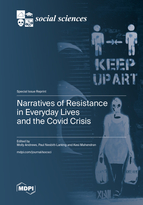Narratives of Resistance in Everyday Lives and the Covid Crisis
A special issue of Social Sciences (ISSN 2076-0760).
Deadline for manuscript submissions: closed (1 March 2022) | Viewed by 26412
Special Issue Editors
Interests: political narratives; the psychological basis of political commitment; political identity; patriotism and aging
Interests: political identities; politics and the media; canadian politics; comparative politics
Special Issue Information
Dear Colleagues,
This special issue explores from a range of perspectives the effect of the COVID-19 pandemic on political resistance. While the pandemic has clearly limited the extent to which people have been able to congregate, at the same time political protests across a range of issues have flourished around the world. When the pandemic first broke out, many people wondered if political activism would come to take new forms; given the necessity to be socially distant, would solidarity and support for political causes be manifested in ways which did not require physical proximity? This special issue also looks at the use of narrative research as a particularly effective tool for investigating the many layers resistance within the ‘pandemic story.’ COVID-19 has both uncovered and covered up profound inequalities across the world; even while some world leaders and royalty caught COVID, it became increasingly difficult to support the claim ‘we are all in this together.’ In many cases, COVID has intensified hidden inequalities, highlighting problems of housing, domestic violence, refugee precarity, mental health problems particularly amongst youth, poorer health conditions of BAME population, and more. The pandemic as it has raged on and on, has also exacerbated inequalities between the Global North and the Global South, with inequitable resources to fight the pandemic, including most visibly the roll-out of vaccines. All the while, despite what might seem like insurmountable and intersecting challenges, people have found ways to express their political resistance, as documented in the articles in this special issue.
Prof. Dr. Molly Andrews
Prof. Dr. Paul Nesbitt-Larking
Prof. Dr. Kesi Mahendran
Guest Editors
Manuscript Submission Information
Manuscripts should be submitted online at www.mdpi.com by registering and logging in to this website. Once you are registered, click here to go to the submission form. Manuscripts can be submitted until the deadline. All submissions that pass pre-check are peer-reviewed. Accepted papers will be published continuously in the journal (as soon as accepted) and will be listed together on the special issue website. Research articles, review articles as well as short communications are invited. For planned papers, a title and short abstract (about 100 words) can be sent to the Editorial Office for announcement on this website.
Submitted manuscripts should not have been published previously, nor be under consideration for publication elsewhere (except conference proceedings papers). All manuscripts are thoroughly refereed through a double-blind peer-review process. A guide for authors and other relevant information for submission of manuscripts is available on the Instructions for Authors page. Social Sciences is an international peer-reviewed open access monthly journal published by MDPI.
Please visit the Instructions for Authors page before submitting a manuscript. The Article Processing Charge (APC) for publication in this open access journal is 1800 CHF (Swiss Francs). Submitted papers should be well formatted and use good English. Authors may use MDPI's English editing service prior to publication or during author revisions.
Keywords
- political narratives
- political protest
- everyday life
- pandemic storytelling







